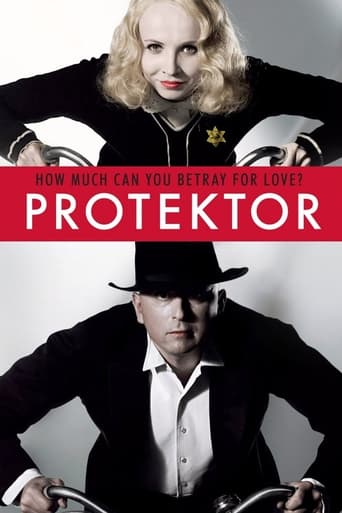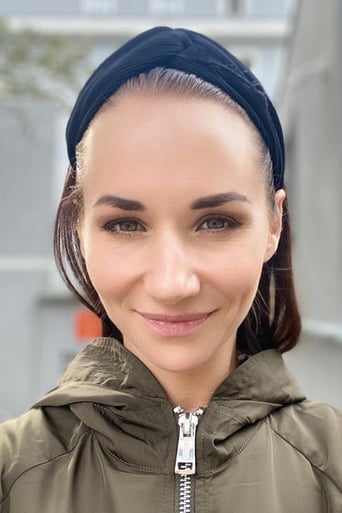Konterr
Brilliant and touching
TaryBiggBall
It was OK. I don't see why everyone loves it so much. It wasn't very smart or deep or well-directed.
Ava-Grace Willis
Story: It's very simple but honestly that is fine.
Bob
This is one of the best movies I’ve seen in a very long time. You have to go and see this on the big screen.
bryanmillsfist
As someone who has an interest in the Nazi period of European history the movie Protektor naturally attracted my interest. I especially enjoy watching foreign films of the period to see how those(and their descendants) who actually suffered under Nazi rule have dealt with the legacy of the period.This film is unlike most films I have seen of the period in that both of the main characters are flawed--deeply flawed in fact. Emil, the husband, is an philanderer, who collaborates with the Nazis.He says that he is doing so to protect his wife, Hana, but we suspect that professional gain plays not a bit part in his motivation to broadcast the Nazis' propaganda.Hana, meanwhile, cannot refrain from engaging in provocative behavior that put both her and Emil at risk for imprisonment in a concentration camp. Hana's obliviousness to the danger of her behavior is the weakest element of this film. From having her pictures take outside and inside of places where Jews are restricted to even harboring a fellow Jew, Hana insists on brazenly flouting the Nazi's regulations. One can sympathize with her to an certain extent, but it does make one wonder about her mental state. Surely no one who has Jewish would be so foolhardy to risk antagonizing the Nazis--especially so after the assassination of Reinhard Heydrich. The Nazi response to Heydrich's killing was extremely brutal. The town of Lidice was leveled and all the males over the age of 16.(males 16 and over were also massacred in the town of Lezaky as well as all of their females)At least 1300 people were murdered in the aftermath of the brutal response to Heydrich's killing. In view of this, Hana's actions indicate an almost pathological desire to be arrested and deported. In having said all that, I do appreciate the efforts of the filmmakers to display the complexity of behind the decisions people made to collaborate with the Nazis. The Nazis gave people only two choices: submit or you or someone you love, will be subject to arrest, torture, and death. This of course does not excuse their actions nor is it a blanket explanation for all who collaborated. Many did so for financial and/ideological reasons. But it does offer a different view from the normal depictions of collaborators we see in film.My number one complaint with the film is that it never explores why Hana is behaving in the manner that she is behaving. While we all can appreciate the resentment at being excluded from society, Hana was not the only Jew to have suffer from oppression in Prague. Why was her reaction so different from the rest of Prague's Jews? Her actions throughout the film are never explained and for a person like me who is familiar with the Nazis and the Holocaust, her brazen behavior strikes me as unbelievable.
Simonster
Viewed at the Festival de Cannes 2010Protektor was the Czech Republic's official submission to 82nd Academy Award's Foreign Language in 2010. It didn't win.Okay, if you want to know the plot go read the IMDb summary, that's what it's for. But if you can't be bothered: Czech radio journalist Emil starts to collaborate with the Nazis to protect his Jewish actress wife, Vera.But Protektor is no Schindler's List and on the scale of Holocaust-themed films it comes way down, being essentially a relationship drama. His career takes off and hers, well, is over and if she's not careful, so is her life. But the unforgivable flaw with the film is that there is no tension here, no atmosphere. Everything unfurls in a drawn out and typically central European narrative manner. The film is simply flat and dull.To make matters worse is the character of Vera, who is, quite simply, a preening and self- obsessed egomaniac. Don't think for a moment I'm saying she deserves what she gets because she is Jewish. But she does deserve everything she gets she embarks, among other things, on a highly visible and dangerous affair and then adopts on a course of behaviour that is quite literally suicidal. It is impossible to like or even sympathise with such an unpleasant individual.Protektor wants to examine how people react under such circumstances but it fails with Emil too. The character is never properly defined. Does the film wish to say that many people also drifted into collaboration as opposed to embracing the enemy with love at first sight? I suppose so, but the director busks around the subject in such a way that his intent is never clear.Visually, in terms of sets and costumes, camera-work and lighting, Protektor looks great. But unless you're a completist or fan of Central European cinema, or just want to see why the Czech Republic didn't take home the Academy Award, there's no real reason to see this film.
tieman64
Director Marek Najbrt's "Protector" opens on the streets of Prague in the year 1942. The Butcher of Prague (Reinhard Heydrich aka The Reichprotektor of Czechoslovakia) has been assassinated, and our hero, journalist Emil Vrbata, is furiously bicycling home.The film then flashes back to the late 1930s, and introduces us to Emil's wife, the movie star Hana Vrbatova. Hana is Jewish, and so when the Nazis invade and occupy Czechoslovakia, she is subjected to all manners of persecution (being banned from public spaces, cinemas, fired from her job etc).An elderly actor offers to supply Hana with papers and forged passports so that she may flee the country, but Hana turns down his offer. She has a fiery, rebellious personality, and is determined to stand her ground. What's interesting, though, is that Hana objects to the Nazis not because of ideological or moral reasons, but because she views them as having "ruined" her film career. She views them as having tarnished her "movie star" and replaced it with a "Jewish Star", a literal badge which she (and all other Jews in occupied Europe) is forced to wear.This self-centred, narcissistic, ego-maniacal and narrow minded attitude infects everyone in the film. Hana's husband, for example, locks his wife at home and forbids her from leaving the house. He claims to be "protecting her" – and initially he is - but what he really wants is to keep her Jewishness under wraps so that he can keep his job (he becomes a famous radio personality) and be with his new mistress. The wider implication here is that whilst the world paid lip service to the horrors of the Holocaust, the reality is that most kept quiet and treated things as a career opportunity (see the romanticising of the profiteer Oskar Schindler, whom historians are now starting to debunk as a saviour); everyone's exploiting in the guise of "protecting".So the film examines how altruism often masks dark opportunity. How the notion of "protecting" someone often conflicts with self interests to such an extent that you actively cause harm to the person you're supposed to be "protecting", resulting in all manners of delusions and feigned interests. This serves as a metaphor for the Reichprotektor of Czechoslovakia, Poland (WW2 was disingenuously waged to "protect" Poland), Hitler, American, Russian, Italian and British politicians, as well as the millions of civilians who fuelled or were complicit in the Imperialist maneuvers of WW2 whilst simultaneously denouncing these very same evils.The last Czech film Hana stars in features a sequence in which she pedals on a fixed bicycle whilst landscape shots are rear-projected on a screen behind her. This motif – expressionistic shots of characters frantically pedalling but going nowhere – is found throughout Najbrt's film. Everyone is frantically pedalling but achieving nothing, forever unable to reach any desirable destination. In a sense, they're trying to escape Naziism but are unable to escape its pull because they are actively supporting that which they pedal against.The film ends with Emil throwing down his bicycle and standing up for his wife. He takes on the role of protector, of that white knight which films like "Schindler's List" mythologise. But the knight is a fantasy and Emil is too late. The Nazis march a crowd of Jews to their death transports as Emil stands helplessly on the sidelines. His moment of action was too little too late. Even worse, Emil's probably also now lost his job.8/10 – This film has a great screenplay. Observe its cleverly ironic title, its loop-around structure (which suggests a noose being pulled tightly), the way it attempts to understand those who collaborated with the Nazis, the way it deftly paints a country under foreign occupation, the way it evokes the imminent Holocaust, and the way it puts forward suggestions for how events like the Holocaust come to be. For these reasons I have given the film a much higher score than it deserves.Unfortunately, Najbrt's direction is inept. This is a low budget film (funded in part by HBO) which shouldn't be trying to look bigger than it is, Najbrt using a number of visual and sonic devices which simply don't work. Better to tune out the film and focus on the writer's voice behind the images.Some more interesting Holocaust films: "Korczak", "The Garden of the Finzi Continis", "Seven Beauties", "Border Street", "Diamonds of the Night", "Europa Europa", "Fateless", "The Last Stop", "Salo", "Amen", "The New Land", "Passenger", "The Pawnbroker", "Homicide", "The Wannsee Conference", "The Boat is Full", "The Grey Zone", "Bizalom", "Au Revoir Les Enfants" and "The Shop On Main Street".
Turfseer
It's 1938 and the Nazis are just one step away from invading and occupying Czechoslovakia. Hana is a young Czech film actress who also happens to be Jewish. She's just appeared in her first feature with her leading man, an older Jewish actor, who warns her that her career is over and that their picture will never see the light of day since the Nazis will never allow its release. He hands her a forged passport and papers to get out of the country but she throws them in the trash, not believing what he says about the imminent German invasion one bit.As the filming of the 'film within a film' is on the verge of completion, we see the two actors riding stationery bicycles with a moving image in the background. As was the usual practice in creating films in earlier days, the illusion of motion is created when the moving image flickers in the background but the object in the foreground is static. Thus, the bicyclist becomes a symbol for the man who pedals furiously but is actually going nowhere. That man is the Czech everyman of 1938 who desperately wishes to escape his tragic circumstances but in reality remains motionless, trapped by the forces of tyranny. Throughout the film, we catch glimpses of the film's protagonist, Emil, pedaling furiously, superimposed over the screen's larger canvas.Hana is married to Emil, a journalist, who is conscripted by collaborating Czech officials, to serve as a radio announcer for the occupying German forces. A colleague at the radio station, Franta, won't keep quiet and he's taken away presumably by the Gestapo and later executed. Emil, no hard core collaborator, chooses to accept the job working as the mouthpiece for the Nazis in order to save his wife from being deported to the death camps. Emil's boss at the radio station is a Nazi sympathizer who offers him the job with the agreement that no one will bother him about his wife as long as she remains holed up in their apartment.Soon, Emil has become popular hosting a cultural program in Prague entitled, "Voices of Our Home". Meanwhile Hana becomes bored sitting at home and jeopardizes Emil's position by leaving their apartment, usually attending the cinema. Hana is not depicted as one who is to be pitied—rather, she's a narcissist who refuses to accept her position as a Jew in Nazi-occupied Czechoslovakia as well as living under the illusion that she's someone important--the up-and-coming film star that she used to be.Emil begins having an affair with a former colleague at the station who is now engaged to his boss. Meanwhile Hana starts hanging out with a former medical student and now a morphine-addicted projectionist. He wants to go to bed with her but she resists his advances, eventually allowing him, however, to take pictures of her in the nude. At this point in the film, things slow down considerably since Hana is no longer talking to Emil with the conflict between the two principals, grinding to a halt.The plot picks up when Hana's former co-star shows up at their apartment having just escaped from a death transport (it's revealed that his forged papers were discovered and he never made it out of Czechoslovakia). Emil is horrified that Hana allows him to take a bath in the apartment and throws him out on the street. Enraged at Emil for throwing her ex-colleague out, Hana dons her blond wig and adopts the persona of her character from her movie and crashes Emil's boss's wedding. Emil is on the verge of being fired for his 'transgression' when Reich Protector Heydrich is murdered by Czech partisans. Nazi soldiers do a house to house search and discover Hana is in the apartment. When they realize who Emil is, they take no action against Hana, despite the fact that the soldiers know she's Jewish. Later the Nazis broadcast a description of a bicycle used by one of the partisans who's killed Heydrich. Emil has another affair with a ditsy gossip columnist and takes her family's bicycle back to his apartment and attempts to hide it; this leads Hana to believe that Emil has switched sides and is now helping the partisans.Now Emil's boss orders him to prove his loyalty by reading a loyalty oath over the airwaves after the Heydrich assassination places all Czech citizens in jeopardy. Meanwhile, Hana has come down to earth after she escapes arrest during the house-to-house search. She packs her belongings and turns herself into the authorities. Emil decides not to show up at the broadcast to read the loyalty oath and goes looking for Hana.In the final scene, Emil finds her in a crowd of Jews being marched to the death transports; as he stands impassively, preventing the group from marching forward, Nazi soldiers club him in the head, pushing him off to the side of the road.Why does Emil choose to stop collaborating and not read the loyalty oath as he promised his hard core Nazi boss? The way I interpret it is that despite being estranged from his wife he still was devoted to protecting her (perhaps deep down he still loved her). Now with his wife gone, he feels that his career is no longer important and no longer sees any point in helping his oppressors.'Protector' does a fine job of depicting how the Czechs coped with the Nazi occupation of their country during World War II. The filmmakers do not seek to judge those who collaborated; their view is only 'this is how it happened'. The film ably draws a distinction between those who enthusiastically collaborated (as in the case of Emil's boss) and Emil himself, who was much more of a reluctant collaborator (always placing himself in jeopardy in an effort to protect his Jewish wife). "Protector" is a welcome addition to the pantheon of Holocaust-themed films.





